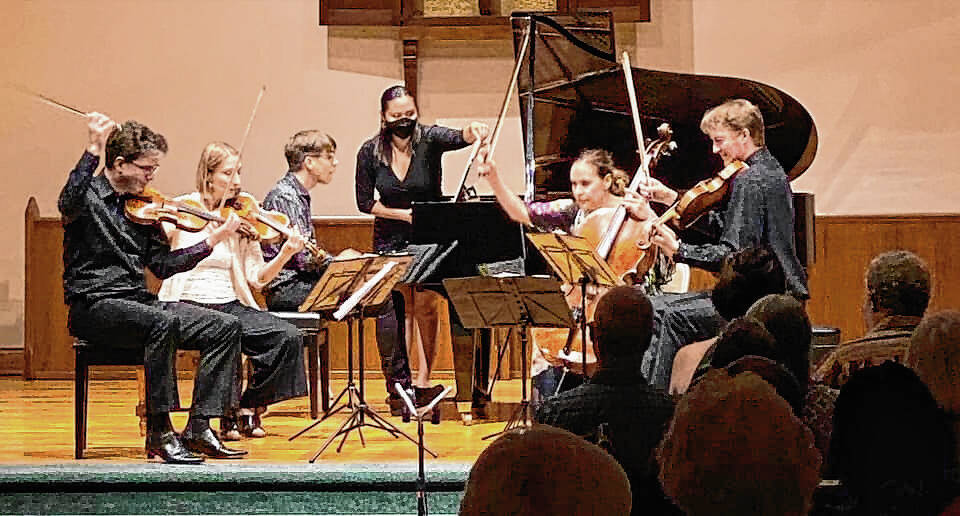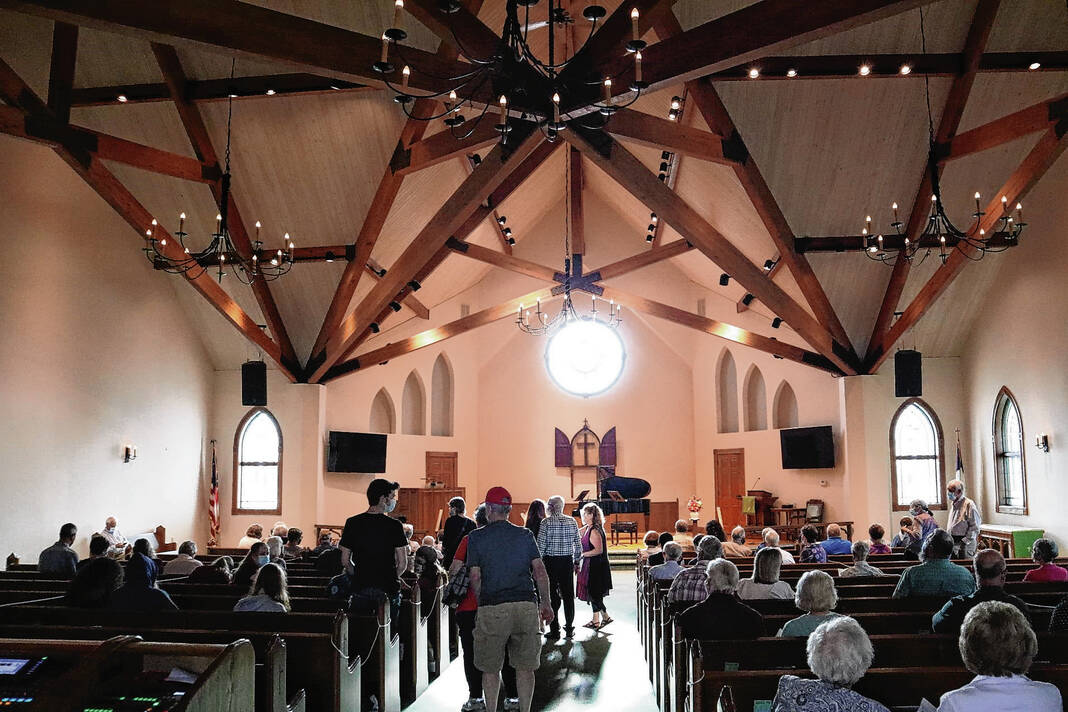
Fry Street Quartet performing with pianist and ChamberFest artistic director Andreas Ionnides at last year’s ChamberFest. Democrat file photo

The first annual ChamberFest Brown County took place last year. The week-long event returns Aug. 14 and will last through Aug. 20.
Democrat file photo
Brown County ChamberFest will return for its second year next month, featuring duos, trios, string quartets and more performing classical pieces at various locations in Nashville.
Audience members will experience classical music performed in an intimate setting, known as chamber music. The genre consists of a small ensemble of musicians — more than two, less than 10 — each performing their own part on traditional instruments that have evolved over the last couple centuries.
The festival’s artistic director Andreas Ioannides is originally from the Mediterranean island of Cyprus, but came to study in the United States when he was 18. He graduated from Indiana University’s Jacobs School of Music with a piano performance doctorate in 2019 and is now a lecturer of piano at Indiana State University in Terre Haute.
In September of 2020 he and a group of local people began planning the first Brown County ChamberFest. Sponsors like the Brown County Community Foundation, Indiana University Center for Rural Engagement, Indiana Arts Commission and the Nashville Arts and Entertainment Commission have made it possible for the event to take place.
But donations are still needed. Ioannides will also perform a solo piano concert on Sunday, July 31 at St. David’s Episcopal Church in Bean Blossom, as a fundraiser for ChamberFest.
The choice in location for this festival was not by accident, even though Brown County is not known for chamber music, Ioannides said.
“We wanted (places) that inspire people, that’s why we chose Brown County, because it’s such a beautiful location,” he said.
Their mission of the music festival is to bridge the musical divides in rural Indiana and make classical music approachable. This accessibility is also apparent in the ticket prices with most concerts in the series being free. While most concerts are free, seating is limited and reservations can be made at the event’s website.
ChamberFest President Annie Hawk said last year’s turnout was good, despite seating restrictions still imposed due to the COVID-19 pandemic. In venues that allowed half-capacity, they met that limit.
“It just worked out perfectly,” she said. “We’re hoping for more this year, but we felt good about the attendance for the first year.”
Organizers surveyed concertgoers and received positive feedback. Some of that feedback was voiced from the audience as performers wrapped up their sets and they shouted “Do it again,” Hawk said.
Popularity has risen with the event even after its first year with people across the world asking to become involved with the board and event itself, Ioannides said.
“Italy, New York City, Chicago — people are beginning to notice our festival, which is really exciting,” he said.
“We really look forward to seeing what the attendance will be like this year. You never really know until the day.”
Even though the event was a success last year, the ChamberFest board — made of four individuals — recognized the undertaking was much larger than they initially had expected. This year, the board added new faces to the event, bringing on additions Ioannides said have been “really valuable.”
“We’ve expanded our board and tried to give more specific duties to different members, within their area people are given freedom to do what they feel, which works well,” he said.
As artistic director, Ioannides is in charge of finding artists to perform and shaping the program of the festival.
This year will be a mixture of old and new performers, refreshing the roster with different types of performances as well.
Whether it’s the guitar duo that will kick off the event or the sextet performing on Saturday, Ioannides said they wanted each event to provide a different experience.
“One of the features of classical music is that it’s old,” he said. “The mainstream repertoire covers five centuries of music. There’s a lot to feed on, so to speak.”
Classical music has a reputation for being “stodgy,” Hawk said, but that is not the case.
“It’s just great music,” she said.
Some of the greatest music ever written has been specifically written for this genre, Ioannides said.
When asked why it’s important for the community to be introduced to chamber music, Ioannides said it’s for the audience to come and see why.
“Usually rural areas don’t get to experience such concerts, because this type of music tends to be offered in bigger cities, more so on a human level. … Classical music really represents a high point in terms of what these great artists of the past created,” he said.
“It doesn’t matter where you’re from, doesn’t matter if you have a background in classical music or not, if you give it a chance and listen with an open heart to this music, chances are you’re going to be moved by it. At the end of the day we’re all human beings and the composers who wrote it were expressing emotions you and I have. That brings people together and that’s why we love music. I’d encourage people to give it a shot.”

